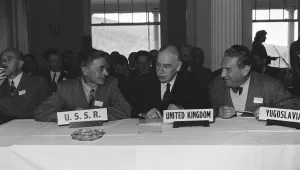International Security is America's leading peer-reviewed journal of security affairs.
Abstract
Ward Thomas of the College of the Holy Cross traces the evolution of the norm against international assassination from Roman times to the present, seeking answers to three questions: Where did the norm come from? How much does it influence state actions? And why does it seem to prevail over other ethical injunctions, such as the principle of proportionality in warfare? Thomas maintains that, historically, great powers have prohibited political assassination because it reinforces their position vis-à-vis other state and nonstate actors and legitimizes acceptable forms of violence such as large-scale intervention and war. Thomas then explores the likelihood that the norm against assassination may be in decline given recent structural changes to the international political system, including an increase in nontraditional modes of violence such as terrorism and guerrilla warfare.
Thomas, Ward. “Norms and Security: The Case of International Assassination.” Summer 2000
The full text of this publication is available in the link below.



